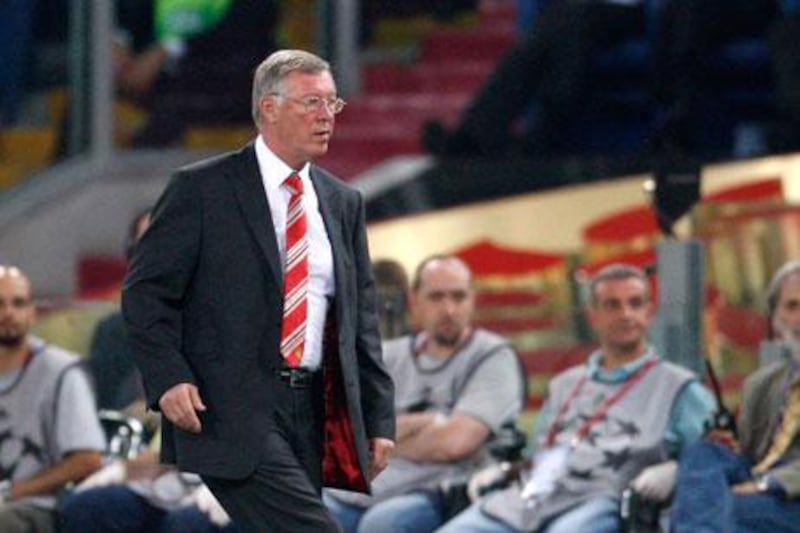Manchester United are learning how hard it is to keep a secret. One of their footballers has, after a long legal battle, failed to keep allegations about his private life out of the British newspapers. And, on Tuesday, the manager Sir Alex Ferguson found what he thought was a private plot being broadcast across the world.
Asked about the importance of Ryan Giggs to his team in a press conference ahead of Saturday's Champions League final, Ferguson detected a line of questioning he disliked. He leaned towards another United employee and suggested, quietly, the journalist be banned from the next session of questions and answers.
These bans, as any correspondent who has dealt with Ferguson will testify, come around frequently. This time, Ferguson was caught suggesting the reporter be excommunicated via a live microphone.
The United manager will not be too embarrassed. His relationship with independent media has long been combative. He metes out favours and punishments to press, television and radio strategically. His freeze on talking to Britain's national broadcaster, the BBC, dates back nearly a decade, an enduring grudge.
Yet we still hear plenty from Ferguson, and not simply because he, as the figurehead of United, is obliged to preview matches.
He wants his words to be read and heard by opponents, so they sense United's pre-match confidence. Expect him to project more of that in his final address, ahead of the final, to the media at Wembley Stadium today.
Ferguson now knows the identity of tomorrow's senior match official. He may make mention of him, too. The Scot often has a great deal to say about referees, just in case they might be vulnerable to officiate United matches forewarned. Ferguson received a domestic touchline ban two months ago for criticising Martin Atkinson; equally, he was at risk of breaching new regulations when Ferguson praised, ahead of a key Premier League fixture against Chelsea, the work of Howard Webb.
If Ferguson's classic posture towards referees in England is ferocious and intimidating, his approach in European football tends to be more nuanced.
A former Uefa official, Bruno Derrien of France, recalls how Ferguson knocked on the door of the referees' room after an Old Trafford Champions League fixture against Olympiakos. The match had featured a red card and five yellows, and Ferguson told Derrien's compatriot, Gilles Veissiere: "You had another really good game tonight."
Veissiere was once a Ferguson favourite. He told him so, via the media, after United's Champions League quarter-final win against Inter Milan in 1999, a match which had been preceded by a memorable stir as Ferguson joked about the slyness of Italians. "When I order pasta, I check under the sauce to make sure," he said before adding, with a time-honoured phrase: "We'll need a strong referee."
Veissiere was assigned the game; Ferguson praised him to the media afterward.
A few years later, talking about the growing strength of Spanish club football, Ferguson told British reporters about the high standards of Spain's referees. Once the comments had been relayed to Iberia, there was laughter among most Spaniards. But it was hard to avoid the thought that Ferguson's flattery might have been appreciated by the senior Spanish men in black, several of whom would sooner or later officiate United matches.
Ferguson is neither unique for using the media to set out a position on match officials, nor to create a pre-match atmosphere. Ever since he was a young manager in Scotland, working outside the Rangers-Celtic duopoly, he has cultivated indignation, an underdog spirit, a feeling that the provincial status of, say, Aberdeen, made the Glasgow establishment liable to conspire against them. He took the attitude to England's biggest club, emphasising Manchester's location, distant from London, seat of the English Football Association, who could be portrayed as cosy neighbours of his toughest rivals in the Premier League era, Arsenal and Chelsea.
Pep Guardiola, Barcelona's head coach, easily recognises that condition, an Us Against Them rhetoric, a form of mind games.
Earlier this season, on a confusing Saturday when it was unclear whether the Spanish Primera Liga would postpone a Barca away match because of a strike by airline workers, Guardiola told the media "we're just a little place up in the north-west". Guardiola is a Catalan and Barca are so strongly associated with Catalonia's sense of independence from - and hostility towards - Madrid, the seat of government, that everybody knew what he was talking about.
Besides, they had heard it before. As captain of Barcelona, some 10 years ago, Guardiola famously told a referee who had ruled out, for an indistinct off-side, a match-winning goal against Real Madrid: "You are messing with the feelings of a nation!" The "nation" meant Catalonia, not Spain.
With the media, Guardiola is generally urbane, seldom churlish. Like Ferguson, he uses press conferences to send messages to his own players and to opponents. Hence, the shock value he imparted when he used industrial language to respond to typically provocative comments from Jose Mourinho, the Real Madrid coach, before the Champions League semi-final.
"In the press room, you, Jose, are the [deleted] boss," Guardiola announced. "I tend to concentrate on what happens on the field."
His Barca players had watched his speech on a live television feed. When Guardiola rejoined them in the dressing-room, they gave him a round of applause.






